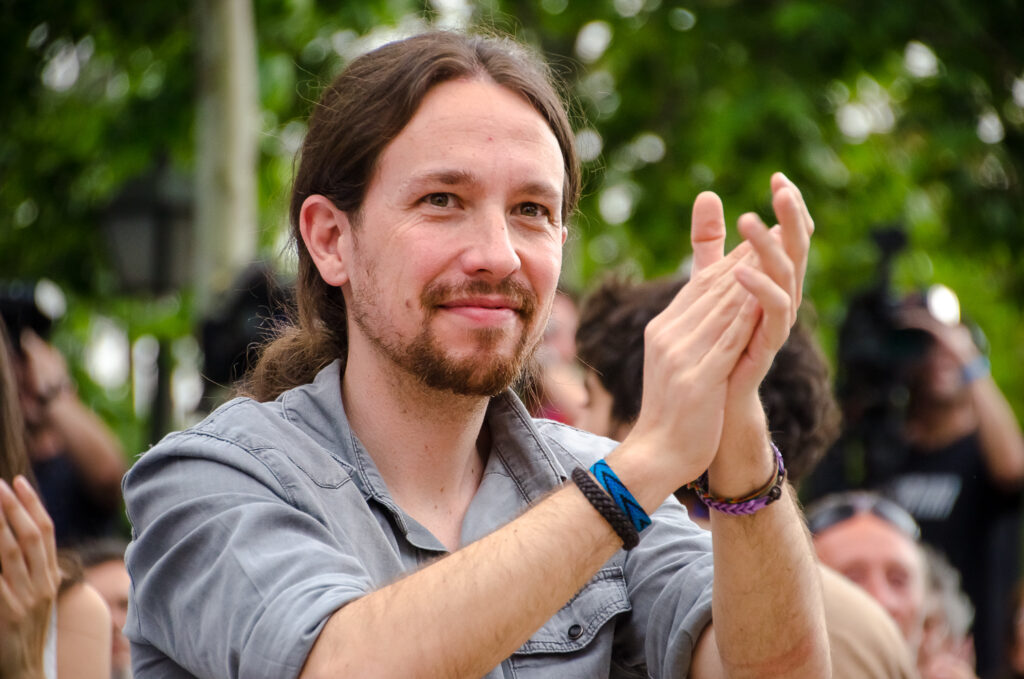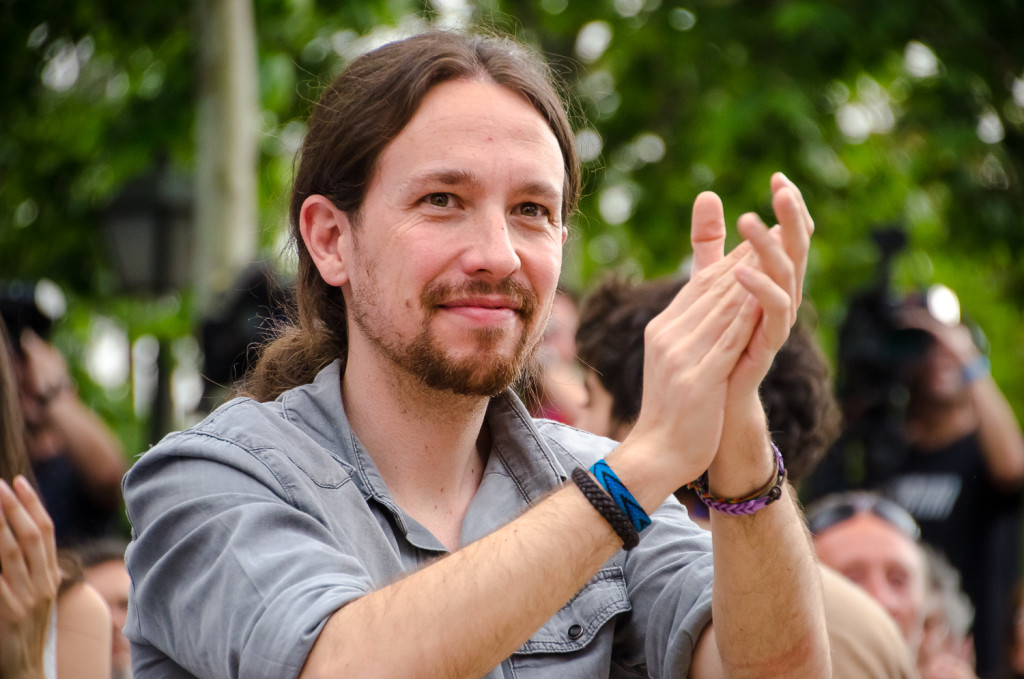
When Pablo Iglesias beat out his deputy and philosophical counterweight Errejón for leadership of Podemos in early February, he made a muted note of the party’s ongoing spiritual crisis: “There’s no doubt we’ve made a lot of mistakes,” Iglesias said, before ending the speech with his usual, “Unity! Humility! On to victory!” Spain’s young, radical anti-austerity party has been paralyzed by political infighting (in Iglesias’s words, “a psycho-drama”) since October, when the right-wing People’s Party (PP) finally secured a winning majority in Spanish parliament. The conservative victory came after 10 months and two general elections in limbo, without any party winning enough votes to form a government. The PP was fighting a fractured left, split between the Socialist Workers (PSOE), Spain’s mainstream leftist party, the old-school communist United Left (IU), and the newcomer, Podemos.
After astounding success in the initial election in December 2015, Podemos was positioned to overtake the hegemonic, centrist PSOE as the leading voice on the left. But then Podemos lost steam, and in the second general election in June 2016, Podemos ran a joint ticket with the communist coalition the United Left (IU) and lost nearly a million votes compared to the first round.
After polling neck-in-neck with the Socialists for months, Podemos is shut out of power while a right coalition governs under a precarious cooperation with the leaderless PSOE. Defanged and outmaneuvered, Podemos leaders Pablo Iglesias and Íñigo Errejón are back to the strategic drawing board.
What went so horribly wrong? An outgrowth of the 15-M movement, essentially Spain’s version of Occupy Wall Street, Podemos had the backing of an energetic and educated middle-class youth (the indignados), unemployed with no promise of upward mobility. Led by Laclauian political scientists, Podemos also had the theoretical firepower to create a left-wing populist machine, a harder, better Syriza (“we lost our virginity in Greece” Iglesias told the New Left Review) that would challenge EU austerity, modelled after the anti-neoliberal efforts of Latin American governments in the 1990s and early 2000s.
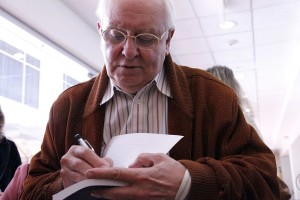
But Podemos became arrogant, stubbornly refusing to cooperate with the “neoliberal PSOE” and keeping the left too fractured to compete. In their push for power, Podemos departed from their grassroots organizing model and became a centralized electoral machine with a top-down policy prescription disseminated straight from Iglesias’s lofty, intellectually pure political and media theory. Their original voting base seems to have become exhausted and alienated. With Syriza similarly subdued, the future of left populism and anti-austerity in Europe looks bleak.
Pink Tide Populism
Forget about relying on an inherently revolutionary proletariat to be an engine of change, says Laclau (roughly) in his work Hegemony and Socialist Strategy. Political identities don’t come prebaked into well-defined economic classes; they grow out of discourse, defining themselves by their relations to other identities. It’s not about accessing the “revolutionary potential” of the marginalized, it’s about creating a narrative that allows marginalized groups to understand their position and organize under a common banner. What’s important and what the populist logic understands, Laclau writes in On Populist Reason, is synthesizing a coalition out of many different political elements with disparate demands, and calling it “the people”, posed in opposition to some “other”. The people are the “real” citizens, the oppressed majority. Laclau writes:
The emergence of the ‘people’ requires the passage–via equivalences–from isolated, heterogeneous demands to a ‘global’ demand which involves the formation of political frontiers and the discursive construction of power as an antagonistic force.[1]
You pull off a synthesis with aggressively vague symbolizing, creating “empty signifiers”, open-to-interpretation phrases and images that different political identities can fill in for themselves. Iglesias speaks fondly of Chávez’s Bolivarian project in Venezuela, which united indigenous, working class and military demands and involved a construction of el pueblo against “the capitalists”. On the campaign trail, Chávez conflated his leadership with the idea of the people: “You are not going to re-elect Chávez really, you are going to re-elect yourselves, the people will re-elect the people. Chávez is nothing but an instrument of the people.”2 The image of Simon Bolivar was a perfect empty signifier for Chávez’s socialist platform, representing land reform, centralization, national pride, redistribution and indigenous rights depending on who the audience was. It was a war of a sovereign underdog Venezuela against the West, against economic imperialism and the abstract, Goliathan oligarchy. For Laclau:
“Populism involves a division of the social scene into two camps. This division presupposes…the presence of some privileged signifiers which condense in themselves the signification of a whole antagonistic camp (the ‘regime’ the ‘oligarchy’, the ‘dominant groups’ and so on…”[1]
The strategy was replicated throughout Latin America (the so-called “pink tide”), from Morales in Bolivia to Kirchnerismo in Argentina.
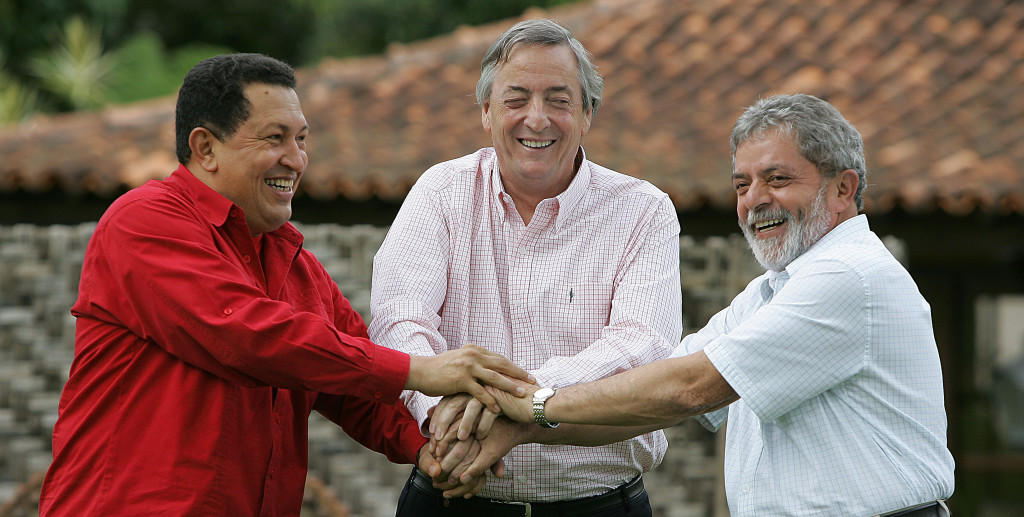
Repurposing the Populist Logic
Translating these ideas to the Spanish context, Podemos carved out a space for itself separate from the orthodox communist left and the centrist left by trying to locate its mission outside of the left-right spectrum. In Iglesias’s words:
…socialist strategy, or a Marxist critique of neoliberalism, poses immense problems in the practical, political sense… So the strategy we have followed is to articulate a discourse on the recovery of sovereignty, on social rights, even human rights, in a European framework. Even if this involves immense contradictions and ambiguities, it’s proved in a certain sense at least to be able to articulate a social and political movement that can stand up to the regime.
Note the direct connection to Laclau: “the language of a populist discourse…is always going to be imprecise and fluctuating…because it tries to operate performatively within a social reality which is to a large extent heterogeneous and fluctuating.”[1]
Podemos branded la Casta, “privileged elites who have hijacked the power from the people (italics added),” explains Iglesias. This included all mainstream politicians, the neoliberal PSOE and, at least implicitly, the orthodox communists. “In Spain, at least, it seems that strategically this has been the only way to create something that wasn’t there.”
With the help of Juan Carlos Monedero, a former advisor to Hugo Chávez, Podemos adopted a grassroots flavor by setting up a system of local organization via “circles”, regional assembly-like clubs that debate and produce policies which are then publicized by the party’s Citizen’s Council. Eerily, and maybe indicative of Podemos’s shaky moral foundations, the “circles” are inspired by Chávez’s “Bolivarian Circles”, barrio-based groups designed to promote patriotism and Chavista programs, which have since evolved into the darker colectivos, essentially armed biker gangs that intimidate and attack non-Chavistas.
Using the rhetoric of “the people” against la Casta, Podemos united a series of particular, middle-class movements born out of 15-M: the anti-eviction network PAH, defenders of the healthcare system, those concerned with public education. Podemos also cleverly targeted Spain’s nationalist movements, the question for Catalonian and Basque independence, promising the region’s referendums to vote on their status in what Podemos began calling Spain’s “plurinational nature”. Podemos became a party of rights and sovereignty, reinvigorating nationalist appeals, just like Chávez.
There’s a question of how deep this leftwing populism goes beyond messaging. Note that while Podemos looks spontaneous and locally mobilized, the real decision-making process wasn’t in fact democratic for very long. Once election season rolled around in 2015, Podemos adopted an “electoral war machine” model called Vistalegre, pushing the circles to the side in order to centralize the Podemos message for the general voting public. As IU politician Alberto Garzón described it, “Podemos uses the terminology of the indignados’s 15-M movement, but in practice it is a very typical party with a general secretary and a team who operate as his praetorian guard…Its economic program was drawn up by two people, not by an assembly.”
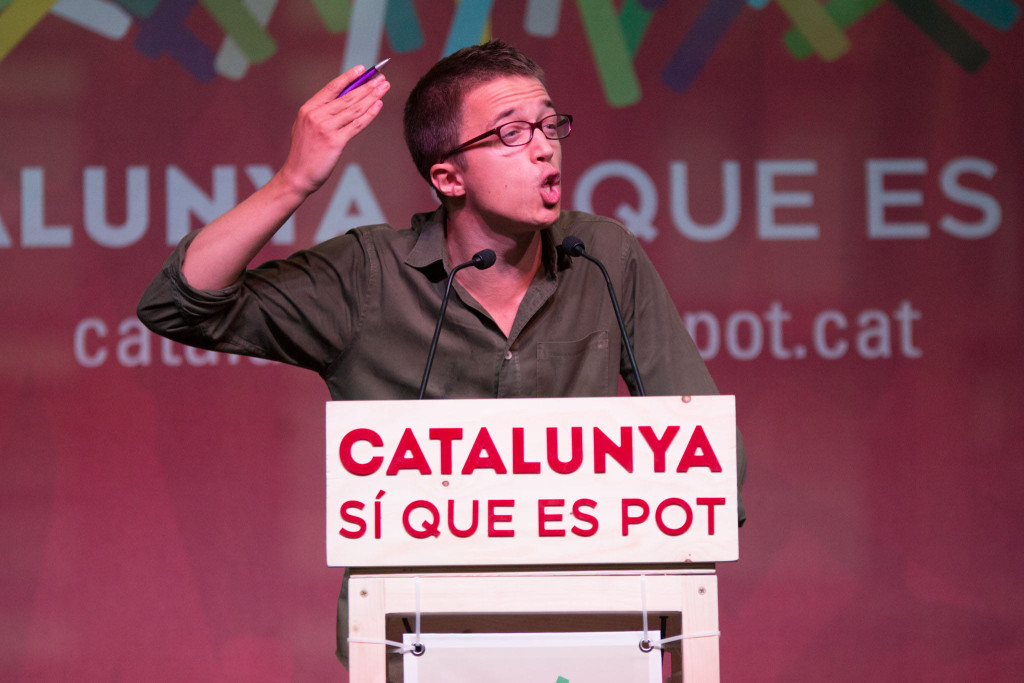
Fighting in the Clouds
Iglesias and Errejón see the Podemos failure in June differently. For Errejón, the moderate and strategic second-in-command, Podemos should have been working to absorb more middle-class votes, and temper its image and language to achieve a wider reach, to become transversal. Errejón sees Podemos in danger of being labelled as just “folkloric” and contrarian. “The PP wants a Podemos cornered in the left” he told an interviewer.
Iglesias believes that Podemos’s strength comes from its anti-establishment position. Backing down from radicalism would just turn Podemos into a second PSOE.
These trajectories clashed in the debate over what to do about Spain’s political deadlock after the first election. Errejón wanted Podemos to strike some compromise with the PSOE, allowing them to govern Spain with Podemos support. Iglesias wanted to defend the party’s anti-neoliberal line, and refused to cooperate with the Socialists, instead opting for a coalition with the communist IU.
For a party whose goal was always electoral victory, maintaining radical purity at the hands of a controlling Iglesias contributed to a fractured left, allowing the unpopular PP to hold onto power.
After the February election, Iglesias remains at the helm—it remains to be seen whether Podemos has hit its ceiling. Again, Garzon’s analysis is sharp: “Podemos wants to seduce doctors, civil servants, the unemployed, and people dying of hunger, with a discourse that’s vague enough to suit everyone. From an electoral point of view that’s very effective. But when it comes to making decisions, I don’t see how you can reach an agreement between the doctor, the civil servant, and the guy starving in the street.”
Comparing the US Left
There are takeaways here for the US experience with left populism, consolidated and organized by the Bernie-Warren base of the same frustrated middle-class youth. For one, they could learn a thing or two from Podemos’s media game—gifting the King of Spain a boxset of Game of Thrones DVDs is an excellent case study in subverting political norms in a non-preachy way. The fate of Podemos could also serve as a warning about balancing theoretical purity and votes. The recent fight for leadership of the Democratic Party, with the “anti-neoliberal” left pushing Keith Ellison, while the establishment backed former Labor Secretary Tom Perez, resembles the same symbolic gesticulating and fracturing of Podemos and the Spanish elections. Bernie and his followers, as always, chose to make the contest an “elites vs. the people” issue, even though Perez has a sterling progressive record.
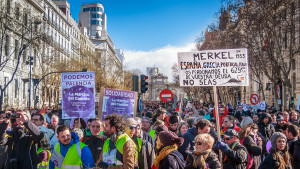
Like Podemos, Bernie’s revolution was (is) an interesting experiment in populist logic, uniting feminist, blue-collar, middle-class and socialist interests behind a series of empty signifiers that took on vague spiritual and emotional connotations, including “revolution” and, I would argue, “single-payer”, “free college”, “neoliberal” and “Nordic model”. But also like Podemos, the Bernie cohort hit a voter ceiling, unable to transcend their “privileged student working at a local café” aesthetic—stubbornness on the part of both the neoliberals and the radicals keeps the left uncompetitive in the face of Trump’s leviathan populist machinery.
As a young progressive student, it can be disheartening. It’s unclear that the anti-capitalist strains running through both Podemos and the Democratic left can survive politically—neoliberalism (if it still means anything) is really effective. Far-left projects always seem to end in dictatorship, economic illiteracy and cult-of-personality–look at Chávez, look at Perón, Kirchner, Iglesias and even Bernie to an extent. It’s equally unclear that running a pure social rights or culture wars campaign works out either. But as disgraced PSOE leader Pedro Sanchez and Hillary Clinton can attest, moderation doesn’t sell well. In Laclauian terms, it feels like we’re grasping to build a chain of equivalences over too disparate a set of demands. We’re not winning the symbols/discourse game, our coalitions aren’t broad enough. It feels like there’s a need to better channel the anti-status-quo energy of populism towards a realistic, scalable policy platform, a need for a more sustainable local mobilization, a need for a sharper, resilient left internet, a more rebellious progressive press (less bogged down in Trump thinkpieces)—maybe some fresher, post-Laclau political theory.
1. Laclau, Ernesto. On Populist Reason, Verso, New York: 2011. pg. 80-120.
2. Kinsbury, Donald, “From Populism To Protagonism (and Back?) in Bolivarian Venezuela: Rethinking Ernesto Laclau’s on Populist Reason”, Journal of Latin American Cultural Studies, September 2016.
The views expressed by the author do not necessarily reflect those of the Glimpse from the Globe staff, editors or governors.


